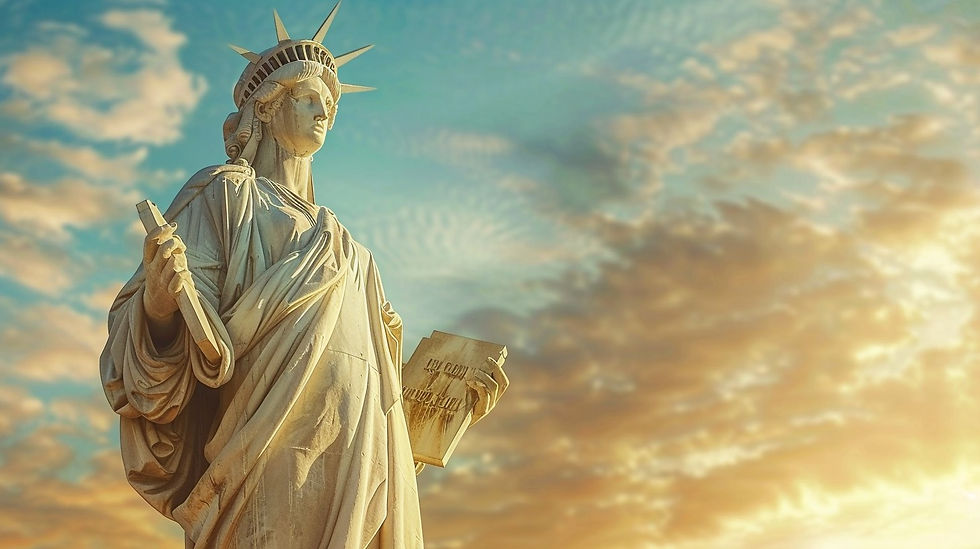Democracy's Enduring Gifts: What We Can Still Be Thankful For (25 Reasons to be Thankful on the 27th and Beyond)
- Peggy O'Neal
- Nov 26, 2025
- 5 min read

In times of political turbulence and division, it's easy to focus on what feels broken in American democracy. Yet even amid our challenges, the foundations of democratic governance continue to provide us with freedoms and protections that much of the world's population can only dream of. Here are twenty-five reasons to remain grateful for the democratic system that, however imperfectly, continues to shape American life.
Perhaps most fundamentally, we retain the freedom to criticize our government openly and without fear of imprisonment. Citizens can publicly denounce the president, march in opposition to policies, and organize movements for change without facing the midnight knock at the door that characterizes authoritarian regimes. This freedom of speech extends to the press, which despite its flaws, remains free to investigate and expose corruption at the highest levels of power.
We can practice any religion we choose, or none at all, without state interference. This religious liberty protects not just mainstream faiths but minority beliefs and the right to change one's mind about matters of conscience. Alongside this, we enjoy freedom of assembly—the ability to gather in peaceful protest, to form organizations around shared values, and to petition our government for redress of grievances.
The peaceful transfer of power, while tested in recent years, remains a cornerstone of our system. Every four or eight years, administrations change, and the defeated party accepts the results and prepares to compete again. This simple act, which we often take for granted, represents a miracle of human governance that eludes many nations.
Our right to vote, hard-won through generations of struggle, allows ordinary citizens to shape the direction of their country. While debates over voting access continue, the fundamental principle remains: every citizen has a say in choosing their representatives. This extends through multiple levels of government, from local school boards to the presidency, giving us voice at every tier of decision-making.
The independent judiciary serves as a crucial check on power. Courts can and do strike down executive orders, overturn unconstitutional laws, and protect individual rights against majority tyranny. Even when we disagree with particular rulings, the existence of an independent judicial branch prevents any one person or faction from wielding unchecked authority.
We benefit from a federal system that allows for experimentation and variation. States can serve as laboratories of democracy, testing different approaches to policy challenges. This means that when we disagree with national direction, we often have the ability to influence change at the state and local level, where our individual voices carry more weight.
The free market economy, protected by democratic institutions, creates opportunities for economic mobility and entrepreneurship. While inequality remains a serious concern, the system allows individuals to start businesses, change careers, and pursue economic opportunity without state permission or control over every aspect of economic life.
We possess the freedom of movement—the ability to travel freely within our country, to relocate to pursue opportunity, and to leave and return without government approval. This mobility, both physical and social, represents a form of freedom that closed societies simply cannot offer.
The rule of law, though applied imperfectly, means that in principle, no one is above the legal system. Presidents can be investigated, corporations can be held accountable, and citizens have legal recourse when wronged. The very existence of legal mechanisms for accountability distinguishes democracies from systems based purely on power.
Public education remains freely available to all children, representing a democratic commitment to equality of opportunity. While the quality varies greatly, the principle that every child deserves an education regardless of their family's wealth or status reflects democratic values at their best.
We enjoy access to information on an unprecedented scale. Public records laws, freedom of information acts, and a robust culture of investigative journalism mean that citizens can scrutinize government actions, understand policy debates, and make informed decisions about their civic participation.
The ability to organize politically without state permission allows citizens to form parties, advocacy groups, and movements that can genuinely challenge those in power. This pluralism ensures that no single ideology can permanently dominate and that new voices can emerge to reshape the political landscape.
Our system protects the right to privacy in our homes and persons, requiring warrants based on probable cause before government intrusion. While surveillance debates continue, the constitutional framework provides protection against the kind of total surveillance state seen in some countries.
We can travel abroad freely, and our passport grants us access to much of the world. American citizenship, whatever its domestic challenges, provides global mobility and the protection of consular services when we're overseas.
The democratic system has enabled tremendous progress on civil rights over time. While the struggle continues, the mechanisms of democracy—voting, protest, litigation, legislative action—have expanded rights for racial minorities, women, LGBTQ individuals, and people with disabilities in ways that would be impossible under authoritarian rule.
We benefit from transparent elections with multiple oversight mechanisms. Despite concerns about election integrity, the system includes poll watchers, election monitors, and judicial review that makes wholesale fraud extraordinarily difficult. Results are public, auditable, and subject to challenge through established legal processes.
The democratic framework protects scientific inquiry and academic freedom. Researchers can pursue controversial findings, universities can host difficult debates, and scientific consensus can influence policy without being dictated by political ideology alone.
Our system allows for civil society to flourish—charities, civic organizations, professional associations, and community groups operate independently of government control. This rich associational life strengthens communities and provides alternatives to state power for meeting social needs.
We have the right to remain silent and to legal representation when accused of crimes. The presumption of innocence, while not always perfectly upheld, represents a fundamental protection against state power that many judicial systems lack.
The democratic process, however messy, forces compromise and coalition-building. While frustrating for those seeking rapid change, this feature prevents radical swings and protects minority rights by requiring broader consensus for major policy shifts.
We can access entertainment, art, and culture from around the world without censorship. The freedom to read, watch, and experience diverse perspectives enriches our lives and broadens our understanding in ways that closed societies actively prevent.
The ability to leave a lasting legacy through democratic institutions means our activism and advocacy can outlive us. Constitutional amendments, landmark legislation, and Supreme Court precedents carry forward the work of previous generations who fought for justice.
Democratic accountability means that failed policies and corrupt officials can be exposed and removed. While the process can be slow and frustrating, the system contains self-correcting mechanisms that allow for course correction without revolution.
Finally, we can pass on these freedoms to our children. Democratic institutions, when maintained and defended, create the conditions for future generations to continue the work of building a more perfect union. Our gratitude should inspire not complacency but the commitment to preserve and strengthen these gifts for those who follow.
In acknowledging these blessings, we don't ignore democracy's failures or cease demanding improvement. Rather, we recognize that the tools for creating positive change—free speech, free press, free elections, and the rule of law—are themselves precious gifts worth protecting. Our gratitude should fuel our civic engagement, reminding us that democracy is not a spectator sport but a participatory endeavor that requires the active involvement of an informed and engaged citizenry. In uncertain times, these foundations remain reasons for hope and continued commitment to the democratic project.

By Democracy Is Us Council Member Joe Castagliola



Comments